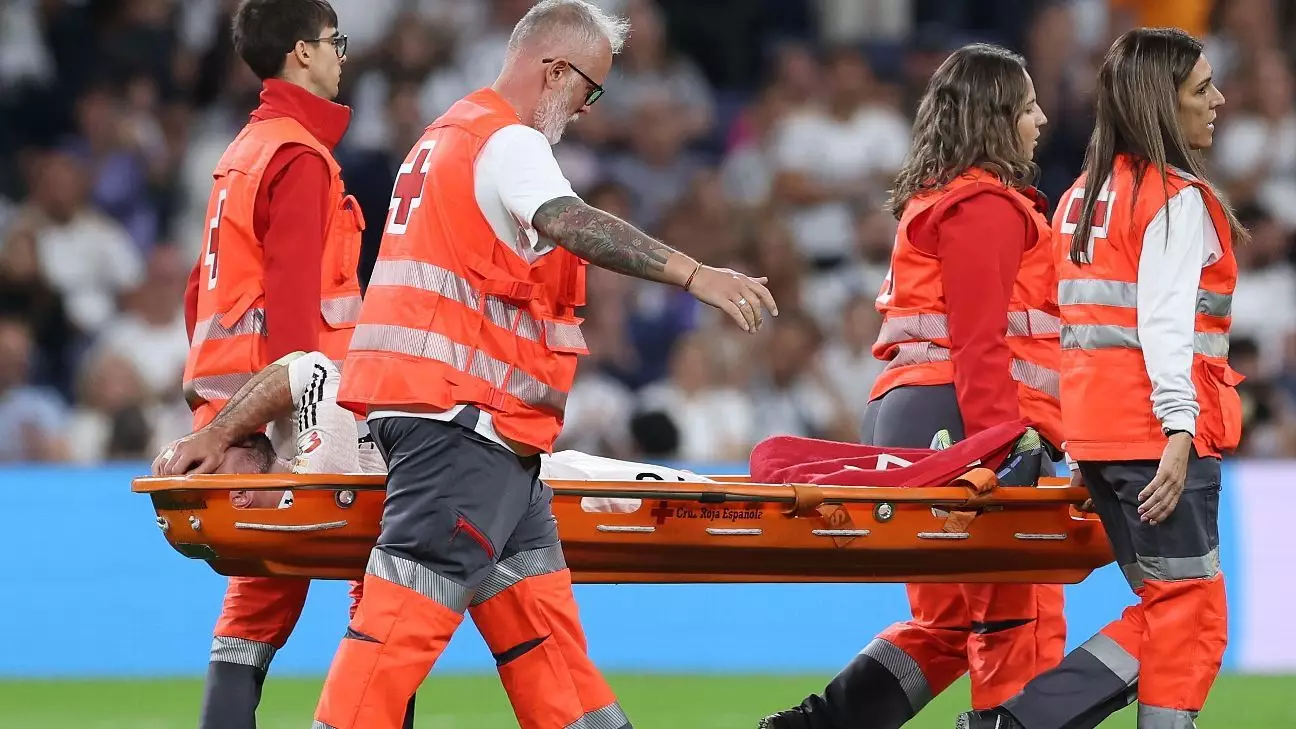In the ever-evolving landscape of football, injuries can compel clubs to expedite decisions they may have otherwise delayed. Real Madrid, a powerhouse in La Liga and European football, is currently grappling with the daunting challenge of replacing Dani Carvajal, who has succumbed to a severe leg injury. This situation compels the club to initiate a proactive approach in the January transfer window, but the complexities of securing the right candidate add layers of difficulty to an already intricate process.
The Severity of Carvajal’s Injury and Its Impacts
The implications of Carvajal’s injury are significant. The official diagnosis confirmed a ruptured anterior cruciate ligament, among other serious issues, necessitating surgical intervention. Such a debilitating injury is not just a temporary setback; it plays an integral role in reshaping the team’s strategy. Carvajal has served as a cornerstone of Madrid’s defense, and his absence means that Lucas Vázquez—a player known more for his attacking flair than his defensive solidity—will now have to fill that void. While Vázquez is a seasoned professional, doubts linger regarding his capacity to manage the responsibilities of a right-back consistently over a prolonged period.
This development has thrust Real Madrid into an unexpected predicament. Vázquez is now the club’s only experienced right-back option, which accentuates the need for a reliable alternative. Real Madrid’s management is aware of this pressing necessity and has already begun scouring the market for suitable replacements.
The January transfer window is notoriously unpredictable and often unkind to clubs hoping to reinforce their squads. Reports indicate that more than ten players have already been offered to Madrid following Carvajal’s injury. However, the landscape of potential signings presents a myriad of challenges. Many candidates are currently tied to contracts with other clubs, making negotiations more arduous. Clubs are often reluctant to part with key players midway through the season, particularly if those players contribute significantly to their current ambitions.
Trent Alexander-Arnold of Liverpool emerges as a prominent figure on Madrid’s radar. His profile aligns well with what the club seeks in a right-back: experience, talent, and familiarity at the international level. However, whether Alexander-Arnold is prepared to leave Anfield, especially with his contract expiring next summer, remains a question mark. The stakes escalate in these discussions, as persuading one of the Premier League’s finest to abandon his current campaign is no small feat.
The focus on finding a right-back highlights a broader issue within Madrid’s defensive lineup. The club’s failure to secure Leny Yoro, a center-back prospect, last summer leaves them vulnerable at the back. With the defensive depth already stretched thin following Nacho’s exit, the pressure is on coach Carlo Ancelotti to come up with solutions quickly. Currently, Éder Militão and Antonio Rüdiger are the preferred central defensive pair, but behind them lies a striking imbalance in depth and experience. David Alaba’s ongoing recovery also complicates matters, forcing Ancelotti to explore unconventional solutions.
The left-back position isn’t spared from scrutiny either. While Ferland Mendy is expected to be a dependable figure, Fran García lacks the established credentials necessary for regular starting duties. Ancelotti and his coaching staff are in a precarious position, trying to juggle emergency solutions and long-term strategies simultaneously.
Despite the immediate need, Real Madrid’s leadership is not entirely overlooking the future. Interest in Alphonso Davies remains a talking point, as the club considers a long-term investment in talent. Targeting younger players and nurturing future prospects has always been a part of Madrid’s ethos, but the pressure to secure a seasoned player immediately weighs heavily.
While the prospect of moving early in the transfer window is appealing, the realities of negotiations with other clubs complicate this ambition. Madrid is keen to avoid a repeat of the frustration experienced last summer when they failed to acquire Yoro.
As Madrid navigates through these choppy waters, the decisions made in the upcoming months will not only impact their current objectives but will also define the club’s trajectory in the seasons to come. The quest for a right-back has transcended a mere transfer target; it has become a testament to Real Madrid’s adaptability and long-standing resilience in the sport. Failure to find a suitable replacement could jeopardize their campaign, emphasizing the importance of strategic planning amid uncertainty in professional football.

